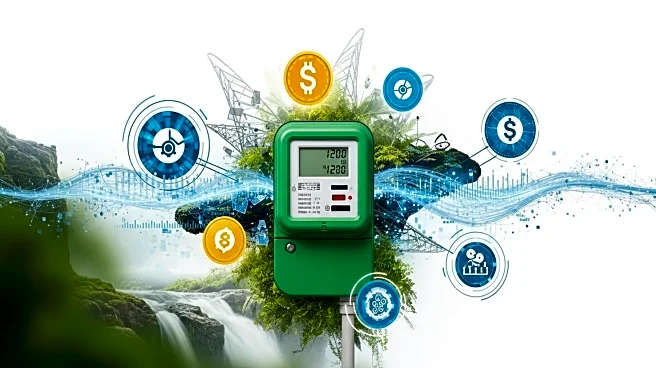What is the story about?
What's Happening?
A recent study explores the impact of FinTech on green energy transition and ecological footprint in BRICS-T countries, which include Brazil, Russia, India, China, South Africa, and Türkiye. The research utilizes principal component analysis to construct a FinTech index and examines its correlation with green energy transformation and foreign direct investment (FDI). The findings indicate that FinTech significantly contributes to environmental sustainability by promoting sustainable financing solutions and supporting clean energy projects. The study also highlights the negative correlation between FDI and ecological footprint, suggesting that FDI can help mitigate climate change effects by transferring environmentally friendly technologies to developing economies.
Why It's Important?
The study underscores the critical role of FinTech in facilitating the green energy transition, which is essential for reducing reliance on fossil fuels and promoting sustainable development. By enhancing financial intermediation and accessibility to renewable energy projects, FinTech can drive significant ecological benefits. The negative correlation between FDI and ecological footprint suggests that international investments can play a pivotal role in transferring clean technologies to BRICS-T countries, thereby reducing environmental degradation. These insights are vital for policymakers aiming to balance economic growth with environmental sustainability.
What's Next?
The findings suggest that BRICS-T countries should focus on policies that increase the use of renewable energy sources like solar, wind, and hydropower to reduce environmental impact. Additionally, leveraging FinTech innovations can streamline investment processes and financial transactions, making green energy projects more accessible. As countries continue to adopt green energy solutions, they may experience a decrease in ecological footprint, contributing to a more sustainable energy mix and facilitating energy savings.
Beyond the Headlines
The study reveals a one-way causality between ecological footprint and FinTech development, indicating that environmental challenges drive FinTech innovations. This relationship highlights the potential for FinTech to play a transformative role in achieving sustainable development goals by promoting clean energy solutions and reducing dependence on environmentally harmful energy sources. The integration of FinTech in environmental policy could lead to long-term shifts in how financial systems support ecological sustainability.















